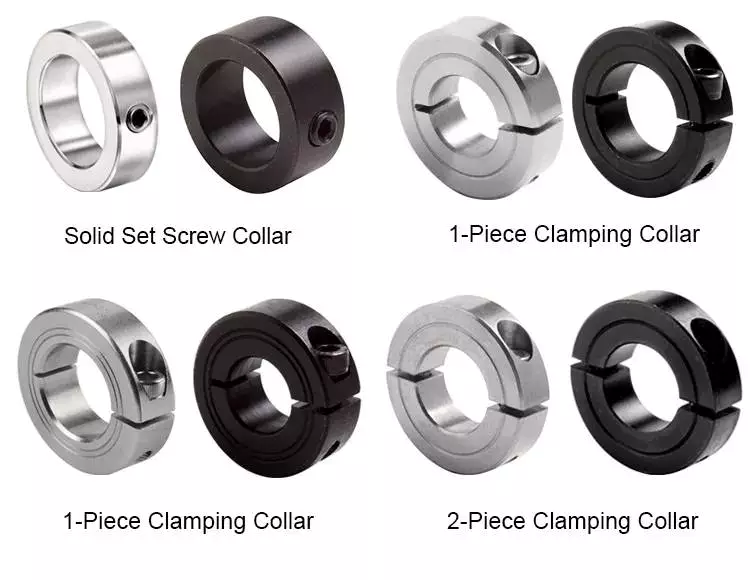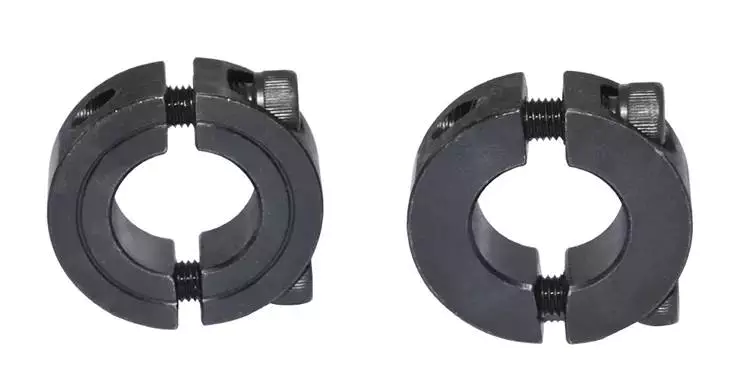
Can I get recommendations for shaft collars suitable for use in harsh environments?
Yes, there are specific types of shaft collars that are designed to withstand harsh environments and provide reliable performance. When selecting shaft collars for use in such conditions, it is important to consider factors such as temperature extremes, exposure to moisture or chemicals, abrasive environments, and high vibration or shock. Here are some recommendations for shaft collars suitable for use in harsh environments:
- Stainless Steel Shaft Collars: Stainless steel shaft collars are highly resistant to corrosion and can withstand harsh environments with exposure to moisture, chemicals, or abrasive substances. They offer excellent durability and are suitable for applications in industries such as marine, food processing, chemical processing, or outdoor equipment where reliability and resistance to rust and corrosion are critical.
- Plated Shaft Collars: Plated shaft collars, such as zinc-plated or nickel-plated collars, provide an added layer of protection against corrosion and wear. These collars are often used in harsh industrial environments where exposure to chemicals, humidity, or outdoor elements is a concern. The plating helps to prevent rust and can extend the lifespan of the collars in challenging conditions.
- Shaft Collars with Seals or Gaskets: Some shaft collars are designed with integrated seals or gaskets to provide additional protection against moisture, dust, and contaminants. These collars create a barrier between the collar and the shaft, preventing the entry of debris or liquids. They are commonly used in applications where water or dust ingress is a potential issue, such as outdoor equipment, agricultural machinery, or industrial machinery in dusty environments.
- High-Temperature Shaft Collars: For harsh environments with high-temperature conditions, it is important to select shaft collars that can withstand the heat without deformation or degradation. High-temperature shaft collars, often made from heat-resistant alloys or ceramics, are designed to handle extreme temperatures. These collars are suitable for applications in industries such as aerospace, automotive, or furnace equipment where exposure to high heat is a concern.
- Specialized Coatings or Materials: In some cases, specialized coatings or materials can be applied to shaft collars to enhance their resistance to specific harsh conditions. For example, coatings such as Teflon or epoxy can provide additional protection against chemicals or abrasion. Additionally, certain materials like titanium or Hastelloy offer superior resistance to corrosion and can be utilized in highly corrosive environments.
When choosing shaft collars for harsh environments, it is recommended to consult with manufacturers or suppliers who have expertise in providing solutions for challenging conditions. They can offer guidance on selecting the most suitable collar materials, designs, and additional features based on your specific application requirements and the severity of the harsh environment.

Can I find information on using shaft collars for positioning and securing components?
Yes, you can find a wealth of information on using shaft collars for positioning and securing components. Shaft collars are versatile mechanical devices that are widely used in various industries and applications to provide precise positioning and secure fastening of components on shafts. Here are some sources where you can find valuable information on using shaft collars for positioning and securing components:
- Manufacturer Websites: Many shaft collar manufacturers provide detailed information on their websites about the applications, installation techniques, and benefits of using shaft collars for positioning and securing components. They often offer resources such as product catalogs, technical specifications, installation guides, and case studies that showcase real-world applications. Visiting manufacturer websites can provide valuable insights into the capabilities and best practices associated with shaft collar usage.
- Online Resources and Blogs: There are numerous online resources and blogs dedicated to mechanical engineering, industrial applications, and component usage. These platforms often feature articles, tutorials, and guides that specifically address the topic of using shaft collars for positioning and securing components. Websites of engineering associations, industry publications, and educational institutions can be excellent sources of information in this regard.
- Technical Forums and Discussion Boards: Online technical forums and discussion boards are vibrant communities where professionals and enthusiasts share their knowledge and experiences. Participating in these forums or browsing through relevant threads can provide valuable insights and practical tips on using shaft collars for positioning and securing components. Users often discuss specific applications, troubleshooting techniques, and innovative use cases, offering a rich source of information.
- Engineering Books and Publications: Engineering books and publications covering topics such as mechanical design, machine elements, or industrial automation often include sections or chapters dedicated to shaft collars and their applications. These resources provide in-depth explanations, theoretical foundations, and practical examples of using shaft collars for positioning and securing components. Libraries, online bookstores, and academic institutions are good places to access these resources.
- Professional Networking: Engaging with professionals in the field, such as mechanical engineers, designers, or maintenance technicians, can provide valuable insights into the practical aspects of using shaft collars for positioning and securing components. Participating in industry conferences, seminars, or workshops, or connecting with professionals through social media platforms like LinkedIn, can facilitate knowledge sharing and discussions on best practices and real-world applications.
By exploring these sources, you can acquire a comprehensive understanding of the principles, techniques, and considerations involved in using shaft collars for positioning and securing components. It is important to consult multiple sources and consider the specific requirements of your application to ensure the most effective and reliable use of shaft collars in your projects.

What is a shaft collar and its role in mechanical systems?
A shaft collar is a mechanical component used in various applications to provide support, positioning, and locking functions for rotating shafts. It is a cylindrical device that fits around a shaft and is typically secured in place using set screws or clamping mechanisms. The collar is designed to prevent axial movement of the shaft and maintain its position within a mechanical system. Here is a detailed explanation of the role and significance of shaft collars in mechanical systems:
Support and Positioning:
One of the primary roles of a shaft collar is to provide support and positioning for a shaft within a mechanical system. It acts as a physical barrier that prevents the shaft from moving along its axial direction. By securing the collar at a specific location along the shaft, it helps maintain the desired position of the shaft relative to other components, such as bearings, gears, or pulleys. This support and positioning function ensures proper alignment and operation of the system, preventing unwanted vibrations, misalignment, or excessive wear.
Axial Load Distribution:
Shaft collars also help distribute axial loads along the length of the shaft. When a mechanical system experiences axial forces or thrust, the collar can help transmit and distribute these forces to the supporting components, such as bearings or thrust washers. By evenly distributing the load, shaft collars help prevent localized stress concentrations and improve the overall load-bearing capacity of the system.
Limiting Radial Movement:
In addition to preventing axial movement, shaft collars can also limit radial movement of the shaft within a given range. The collar's design and tight fit around the shaft create a mechanical barrier that restricts radial play or shifting of the shaft. This is particularly important in applications where precise positioning or clearance control is required, such as in linear motion systems, conveyor systems, or machinery with rotating components.
Securing Components:
Shaft collars often serve as a means of securing other components onto the shaft. They can act as a stopping point or reference surface against which other elements, such as bearings, sprockets, gears, or pulleys, can be mounted. By securing these components with set screws or clamping mechanisms, shaft collars ensure their proper alignment and prevent unintentional movement or disengagement during operation.
Adjustability and Easy Installation:
Another advantage of shaft collars is their adjustability and ease of installation. They can be easily positioned and moved along the shaft without requiring complex tools or specialized equipment. This adjustability allows for fine-tuning of the shaft's position and alignment within the system. Additionally, the simplicity of their design and installation makes shaft collars a cost-effective solution for various mechanical applications.
Overall, shaft collars play a significant role in mechanical systems by providing support, positioning, load distribution, and component securing functions. Their presence helps ensure the stability, alignment, and efficient operation of rotating shafts in diverse applications across industries such as manufacturing, automation, robotics, and machinery.


editor by CX 2023-11-14